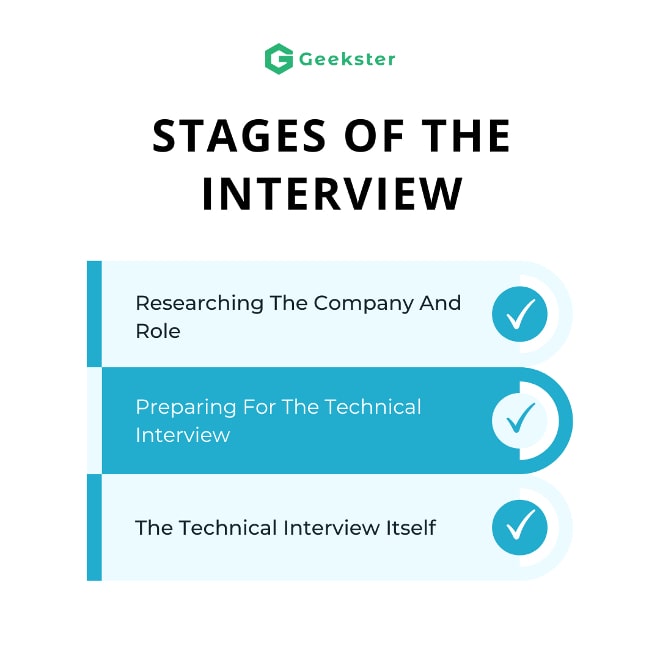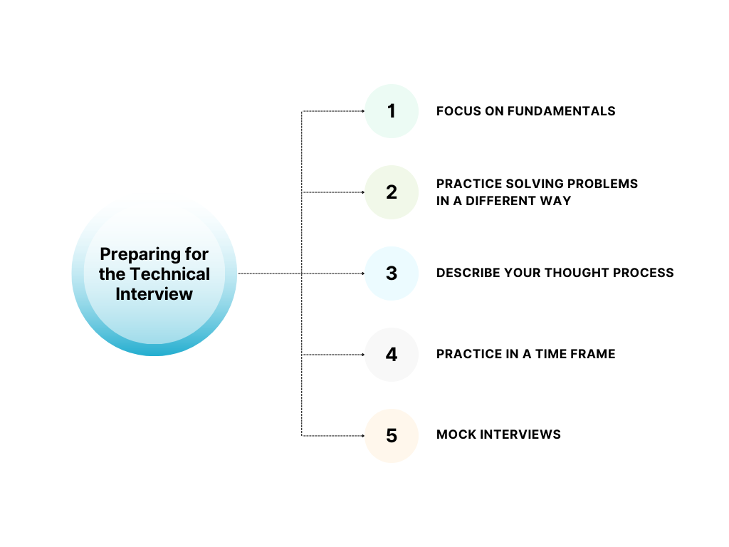How to Prepare for Tech Interviews? Essential Steps for Success in 2023 Neeraj Mishra The Crazy Programmer
Are you preparing for a tech interview? Kudos on taking a step towards securing a promising career in the tech industry. But with the high competition for tech jobs, it is crucial to stand out and make a lasting impression during the interview.
In this article, we’ll walk you through how to prepare for a tech interview to increase your chances of landing the job. From researching the company and role to practicing interview skills, we’ll cover everything you need to know to be fully prepared. Read on to gain a competitive edge and ace your following tech interview.

Stages of the Interview
The technical interview process typically includes several stages. These may include:
1. Researching The Company And Role
Before diving into the technical aspects of the interview, it is essential to research the company and the role you are applying for.
- Learn about company culture, mission, and values from the company’s website or presentation and align your answers with them. You can also talk to people working in the company, using your network.
- Read the Job Description carefully to understand the roles and skill sets needed. You can use this information to prepare for any technical questions that might be asked during the interview.
For example, Java developer, ReactJs Interview Questions for React developer, AngularJs Interview Questions for Angular developer and more.
After going through the above step you’ll be able to understand if the role is right for you, prepare for the role, and set yourself apart from other candidates.

2. Preparing For The Technical Interview
Let’s first understand what exactly is a technical interview.
Tech interviews, in contrast to other interview types, include tasks and challenges. They resemble exams more than the standard question-answer-based format of an interview.
In a technical interview, the interviewer is there to assess your problem-solving ability and expects you to be able to communicate the solution properly and not just tell.
It is essential to brush up on your technical skills and knowledge. This includes reviewing computer science fundamentals like DBMS, Operating Systems, practicing data structures and algorithms (DSA), front-end languages and frameworks, back-end languages and frameworks, system design, database design and SQL, computer networks, and object-oriented programming (OOP).
3. The Technical Interview Itself
Now, this is your final step where all the preparation you’ve done will come to the test. The interviewer will ask you a series of technical questions primarily based on their requirements and your resume (don’t lie about your resume). Generally, the interview tone is set by you during the introduction, and you’ll be demonstrating problem-solving skills and technical knowledge.
Preparing for the Technical Interview

1. Focus on Fundamentals
Know your topics inside and out. You are expected to know both in detail and be able to relate them to the problem you solved during the interview.
If you applied for Java developer know the basic and advanced concepts of that language. For example, is Java purely object-oriented language? Or Can we perform multiple inheritances in Java?
Apart from language, know the fundamentals of Computer Science i.e. Operating System, depending on the company to company some companies may ask you to design a system e.g. Design a social network.
Then comes Software Development Life Cycle (SDLC) knowing the different types of models and steps in SDLC.
You should be able to code and express the thought behind an algorithm solution you are pitching along with its Time and Space complexities.
2. Revise and Practice
Make sure to revise and practice the key topics that are typically covered in technical interviews.
Data Structure and Algorithms (DSA) which is most often asked in online assessments and your first round of technical interviews. Data Structures from Arrays, Multi-dimensional arrays, Stack, Queues, Linked Lists, Trees (Generic Tree, Binary Tree, Binary Search Tree, AVL, etc), HashMap, Graph, etc. and their algorithms like Sliding windows, DFS, BFS, Searching and Sorting techniques, Recursion, Dynamic Programming are must-have.
You can check this for Data Structure And Algorithm Interview Questions and practice before your interview.
Front-end languages and frameworks – depending on the company you are interviewing for you should be able to comfortably discuss HTML, CSS and Javascript at least. Apart from these must-haves learn about at least one front-end framework like React or Angular.
Back-end languages and frameworks – For the back end there are endless languages to choose from, some of the top languages are Java SpringBoot, JavaScript Nodejs, Python, C#, etc.
There are plenty of resources available on the internet from where you can learn and practice technical skills. And if you are on a tight schedule it is suggested to go for a guided course path like Full Stack Web Development Program and for working professionals [LINKS] Advanced Web Development Program.
Object Oriented Programming (OOPs) – In almost every technical interview OOPs concepts are a must-have. Many interviews start with the question “What do you understand by Object Oriented Programming (OOPs)?” with follow-up questions on four pillars of OOPs i.e. Inheritance, Polymorphism, Encapsulation and Abstraction. Know how to achieve abstraction, interfaces, runtime and compile time polymorphism, overriding vs overloading, types of inheritance (for more such last minutes questions visit)and sometimes the interviewer can ask you to code a class for a specific condition.
Database Management System (DBMS) – One of the essential topics for the technical interview is DBMS. In this, you can be asked to design a Database along with various questions around fundamentals of DBMS like the difference between MySQL vs SQL, Normalization, SQL queries and more. Have a look at Top 30 DBMS Interview Questions 2023
System Design – Many Big Tech companies and startups like Google, Amazon, Microsoft, Atlassian, Meta, CRED, CureFit etc ask questions based on System Design to test your solution design from architecture to coding. You should know basic concepts like Load Balancing, Indexes, when to use SQL vs NoSQL databases, Distributed systems, Caching, etc. At the low level, it deals with OOPs, relationships between classes, and coding practices like SOLID principles. System design interviews don’t have a single particular solution you will be communicating with the interviewer to understand the requirement and come up with a solution.
3. Practice Solving Problems in a Different Way
The preparation in itself is a major step that prepares you to shine in a tech interview, there are some tips you should follow:
- Don’t memorize the solution instead understand the problems in depth and ask questions, seek answers the more you understand how a particular algorithm works better than the other, the more will be your confidence during the interview and you’ll be able to come up with better and innovative solutions.
- Try to come up with a brute force solution first, then make it better and finally showcase your skills with the optimized approach.
- Give a set time for the solution then take hints and try again. Looking at a solution should be the last step and even so try to code it yourself.
- Consistency is the KEY TO SUCCESS.
4. Describe Your Thought Process
An interview is a two-way conversation between you and the interviewer. It is important to come up with a solution but to also be able to explain your thoughts clearly and how you arrived at a particular solution. This skill comes with practice, so find a code buddy  it can be a friend who is also preparing, your mirror, or simply recording yourself. There can be many more ways for practising. Find what works best for you.
it can be a friend who is also preparing, your mirror, or simply recording yourself. There can be many more ways for practising. Find what works best for you.
5. Practice in a Time Frame
During the interview, you’ll likely be given a time limit to solve a problem. Practicing solving problems within a specified time frame can help you to build confidence and be more efficient during the interview.
6. Mock Interviews
Conduct mock interviews with friends or reach out to services providing mock interviews with professional interviewers to get an idea of what to expect during the real interview. Seeking feedback and continuous learning is the key.
Remember these points:
- Ask for clarifications – Ask questions for classification it is better to take some time and attempt the question properly rather than making silly mistakes later on.
- Interviews can be lengthy so practice mock interviews to get the experience.
- Practice problem-solving daily, and make it a habit this will help you manage your cool during the interview.
- Refrain from lying in your resume as you should be able to speak about the tech mentioned in your resume.
- Practice the infamous question “Tell me about yourself”, try to mention missing points on your resume, add personality and end it on the topic in which you feel comfortable.
Bonus Tips to Prepare for Your Technical Interview
So far we have covered a lot on the technical part of preparation. It is time that we talk about some other important things that an interviewer checks even during the technical rounds.
Yes, we are talking about soft skills
An employer does not want an employee who cannot collaborate and communicate with the other team members. An employer wants someone to take responsibility, be accountable and take initiative to drive a better output at work. You can check this blog for an in-depth understanding of soft skill requirements during technical interviews
Usually, a candidate is judged on the following parameters
Communication skills: To be able to present your ideas, defend your approach and be able to talk without losing your calm even when criticized.
Culture fit: A lot of companies ensure that the candidate is fit for the company culture. It takes years for companies to build a culture where the employees thrive, bring productive solutions to work, and stay motivated. Thus, they seek traits in a candidate who can continue to build and maintain the same culture after joining.
Ability to execute: Execution ability is another trait that companies look for in a candidate. Ability to execute ideas, develop them, enable teams to perform, and most importantly build good bug-free products.
Integrity: Integrity and honesty is another fundamental trait that employers look for. This is critical to building the company culture. They access you on this trait to ensure that they can implicitly trust you with their company secrets, goals, and work.
Questions that access you on the above-mentioned traits:
Q: Tell us about the most significant problem you solved at your workplace?
Q: How do you feel about working in a team spread across different time zones?
Q: How would you approach teaching new concepts to your team members? Or How would you implement a new work methodology in your team for example OKR?
Q: What was the most difficult decision you had to take at work?
Q: How do you deal with criticism?
Q: Have you ever performed a task for which you did not have the relevant skills? How did you do it?
When you prepare for an interview, no amount of preparation is enough and no preparation is less. While these most things, you also must check these questions to ensure you did not miss anything. If you are confident in your ability to prepare well, you can join Geekster’s Full Stack Web Developer Course for guidance from experts.
Conclusion
Preparing for a tech interview is a multi-step process that requires research, technical skills, soft skills, and practice. By doing the steps mentioned in this blog you’ll be well on your way to making a lasting impression during your interview.
Remember to stay confident and focused, and don’t hesitate to seek feedback from mentors or others who have gone through the process.
A successful tech interview is within reach if you take the time to prepare.
So, start now you can do it.
Let’s go!
The post How to Prepare for Tech Interviews? Essential Steps for Success in 2023 appeared first on The Crazy Programmer.
from The Crazy Programmer https://ift.tt/9mshAHW
Comments
Post a Comment